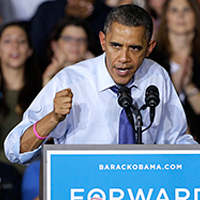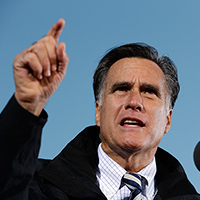We asked our Facebook friends: “What would you have asked the candidates if you had been in the audience at the town hall debate?” We got hundreds of replies on a range of topics. From now until Election Day (Nov. 6), we’ll do our best to answer your questions for the candidates by researching what they’ve said on the issues in the past.
Jim Kennedy would ask the candidates:
“how will you address our crumbling infrastructure,
given the huge debt issue?“
 During his first term, Barack Obama allocated $53 billion to create jobs by repairing America’s roads, bridges, mass transit and other public-works endeavors. His proposal contained plans for an infrastructure bank that would use private investment to fund new projects. In November 2011, the president’s plan was blocked by Senate Republicans, who unanimously opposed it, saying that the spending totals were too high.
During his first term, Barack Obama allocated $53 billion to create jobs by repairing America’s roads, bridges, mass transit and other public-works endeavors. His proposal contained plans for an infrastructure bank that would use private investment to fund new projects. In November 2011, the president’s plan was blocked by Senate Republicans, who unanimously opposed it, saying that the spending totals were too high.
Throughout the winter and into the spring of 2012, Obama continued to support high-speed rail initiatives, which were a major part of his 2011 proposal. In June 2012, the chief of the Federal Railroad Administration said that the president’s support for high-speed rail “remains as strong as ever,” citing $8.5 billion for the development of high-speed and intercity rail projects in the president’s proposed 2013 budget.
The idea that America’s infrastructure has fallen behind that of other nations has figured prominently into the Obama administration’s discussions about the stimulus plan. America’s “infrastructure used to be the best, but our lead has slipped,” the president said in January 2011. During the summer, U.S. Transportation Secretary Ray LaHood argued that China’s infrastructure is outpacing America’s because it is a country in which “only three people make the decision” on projects like high-speed rail lines. LaHood blamed Republicans elected to Congress in 2010 for the lack of progress on infrastructure projects during the president’s term. Some infrastructure advocates remain hopeful that projects like high-speed rail lines will move forward should the president be re-elected.
In August, the Obama administration set aside $500 million in earmarks for “shovel ready” infrastructure projects as part of an infrastructure program called “Use it or Lose it: We Can’t Wait.” LaHood said he believed it would create thousands of new jobs for construction workers repairing roads and bridges.
 For his part, Mitt Romney told Fortune magazine that one of the government subsidies he’s committed to cutting is Amtrak, which cost taxpayers $1.5 billion last year.
For his part, Mitt Romney told Fortune magazine that one of the government subsidies he’s committed to cutting is Amtrak, which cost taxpayers $1.5 billion last year.
Romney has also acknowledged the need to renew the nation’s infrastructure. In an interview with the Cleveland Plain Dealer, Romney discussed the need to re-imagine how goods travel across the country and to update transportation systems that are now fifty or sixty years old. Romney said he favored public-private partnerships to conceive ways that infrastructure improvements could pay for themselves — the Plain Dealer cites one public-private bridge-repair partnership, orchestrated by Republican Ohio Governor John Kasich, as an example of how this may work.
In a September 2011 interview with commentator Larry Kudlow, Romney said he opposed funding repairs through an infrastructure bank, like the one Obama had proposed. He said that, while the country was in dire need of infrastructure repairs, improvements should be undertaken only when there are “revenue streams to pay for it.”
In a town hall in Charleston, SC, in December 2011, Romney echoed his comments to Kudlow, saying that infrastructure was in need of repair, but that repairs should happen only on projects that could generate money to cover the cost of repairs. He gave, as an example, harbor dredging projects, which could pay for themselves through revenue generated when shipping companies use the harbors.

